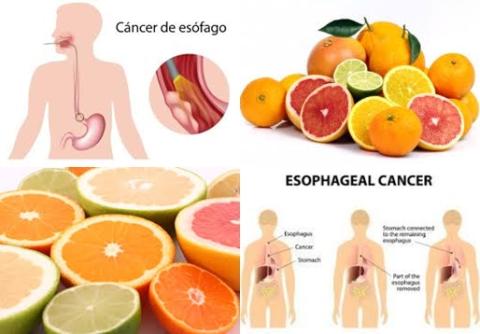
Objectives:
Esophageal cancer (EC) is the eighth most common cancer and the sixth most frequent cause of cancer death in the whole world. Many studies have investigated the association between citrus fruit intake and the risk of esophageal cancer, but the results are inconsistent and not analyzed by category. Therefore, this review article has been conducted.
Does citrus fruit intake reduce esophageal cancer risk?
Study design:
This review article included 20 case-control studies and 5 cohort studies.
The studies were published between 1983 and 2015 with a total of 2,456 esophageal squamous cell carcinoma (ESCC) (range 47-395), 1,284 esophageal adenocarcinoma (EAC) (range 67-282) and 1,990 esophageal cancer (EC) (range 53-1,246).
The Newcastle-Ottawa Quality Assessment Scale (NOS) scores of 25 clinical trials range from 5 to 9, with an average of approximately 7. The median score was 6.75 for case-control studies and 8 for cohort studies.
There was no evidence of publication bias.
Results and conclusions:
The investigators found in 10 case-control studies and 3 cohort studies a significantly reduced risk of 41% [pooled RR = 0.59, 95% CI = 0.47-0.76, I2 = 60.7%, p = 0 .002] for esophageal squamous cell carcinoma in the citrus fruit consumption group.
Significant because RR of 1 was not found in the 95% CI of 0.47 to 0.76. RR of 1 means no risk/association.
The investigators found in 5 case-control studies and 3 cohort studies a non-significantly reduced risk of 14% [pooled RR = 0.86, 95% CI = 0.74-1.01, I2 = 0.0%, p = 0.598] for esophageal adenocarcinoma in the citrus fruit consumption group.
Non-significantly because RR of 1 was found in the 95% CI of 0.74 to 1.01. RR of 1 means no risk/association.
The investigators found in 20 case-control studies and 5 cohort studies a significantly reduced risk of 35% [pooled RR = 0.65, 95% CI = 0.56-0.75, I2 = 51.1%, p = 0.001] for esophageal cancer in the citrus fruit consumption group.
The investigators found in subgroup analysis significant inverse associations between citrus fruit intake and the risk of esophageal squamous cell carcinoma in cohort studies [OR = 0.66, 95% CI = 0.49-0.88] and hospital-based cohort studies [OR = 0.82, 95% CI = 0.33-0.75], but not in population-based cohort studies [OR = 0.82, 95% CI = 0.62-1.09].
The investigators found in subgroup analysis significant inverse associations between citrus fruit intake and the risk of esophageal squamous cell carcinoma in >7 scores studies [OR = 0.56, 95% CI = 0.43-0.72].
The investigators concluded that citrus fruit intake reduces risk of esophageal cancer, particularly esophageal squamous cell carcinoma. However, further studies are warranted to find which constituents in citrus fruit prevent esophageal cancer and its mechanism.
Original title:
Intakes of citrus fruit and risk of esophageal cancer: A meta-analysis by Zhao W, Liu L and Xu S.
Link:
https://www.ncbi.nlm.nih.gov/pmc/articles/PMC5895383/
Additional information of El Mondo:
Find more information/studies on fruit consumption and cancer right here.